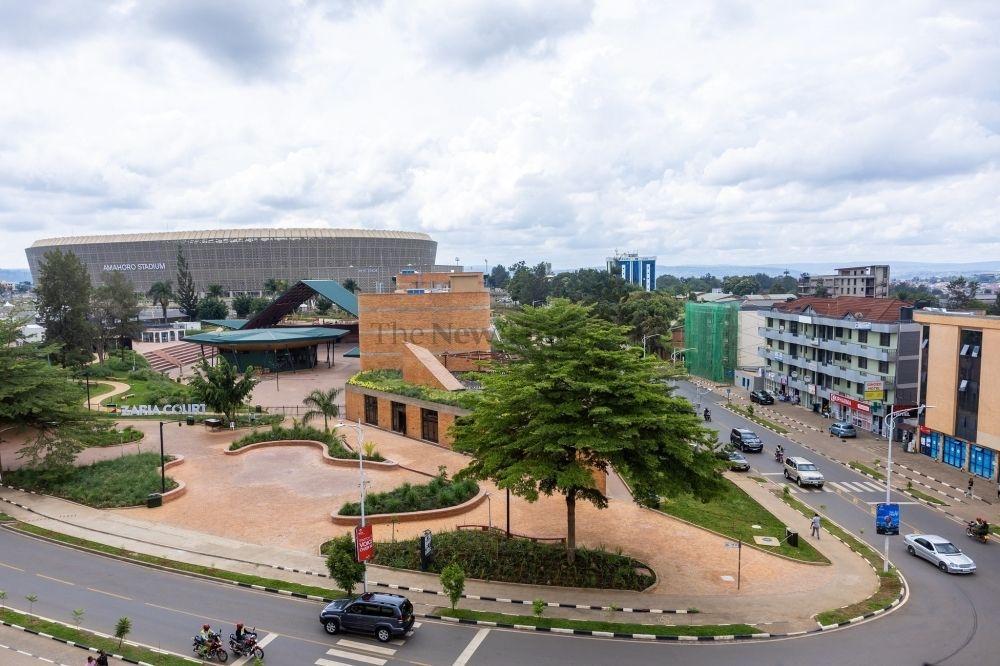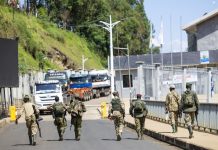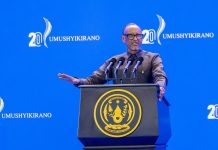Africa-Press – Rwanda. At first glance, Zaria Court, Rwanda’s newly inaugurated multi-use sports and cultural hub, may look like a sleek architectural addition to Kigali’s fast-evolving skyline. But the vision behind it is far more ambitious: to turn sports, arts and youth culture into a serious economic engine.
PICTORIAL: Kagame, Masai Ujiri inaugurate $25m Zaria Court Kigali complex
The facility, officially opened on July 28 in the heart of Kigali, forms the core of a broader plan to create a self-sustaining Sports City, anchored around BK Arena and the revamped Amahoro Stadium. But what’s unfolding is more than just infrastructure. Rwanda is attempting something few African countries have pulled off at scale: turning urban design, talent cultivation, and private capital into a monetized creative ecosystem.
“We’ve long treated sports in Africa as just recreation or competition. But this, this is sports as economy, as industry,” former NBA player and Giants of Africa co-founder Masai Ujiri said at the launch. “This court creates community. The ecosystem creates GDP.”
From the outset, Zaria Court was conceived as a platform for African creativity, a venue where artists, chefs, designers, and athletes could earn, collaborate, and grow. On-site amenities include sports bars, playgrounds, hotels, retail outlets, co-working gyms, and event spaces, creating what insiders describe as a closed-loop ecosystem for local and regional value creation.
This kind of holistic urban planning is rare in Africa, where public sports facilities often deteriorate from lack of investment and vision.
“Across the continent, you’ll find stadiums built 50 years ago that are now rotting. They’re painted when there’s a tournament, then abandoned again,” Ujiri noted. “Zaria is different. This is sustainable urban infrastructure.”
Rwanda’s leadership sees this as more than a showcase project. It’s a strategic response to the continent’s demographic curve, where over 60 percent of the population is under 25. In place of donor-funded sports initiatives or one-off talent exports, the model banks on creating durable, local ecosystems that support African youth to stay, train, and thrive at home.
“Our youth are talented. But talent without a system remains idle. Zaria Court is the system,” RDB CEO Jean-Guy Afrika echoed. “We’ve built a place where ambition can be scaled and monetized.”
“Already, Kigali’s BK Arena is drawing regional and international performers, with music tours, comedy shows, and sports leagues turning into new channels of income and cultural diplomacy. None of this would have materialized without political will and perhaps no African leader has staked as bold a bet on sports as a development pillar as Rwanda’s President Paul Kagame,” Ujiri underscored.
“I don’t have to do everything,” President Kagame said at the launch.
“But I can create the environment that allows others to do what they do best and together, that builds community, cities, and ultimately, the country.”
This approach enabling private sector innovation while steering national direction has helped Rwanda attract partnerships with global sports executives, architects, and creative entrepreneurs. It has also begun to reshape Kigali’s image from a conference capital to a destination for youth and creative enterprise. “This isn’t just about basketball. This is Rwanda showing that culture is capital. That our cities can be living platforms, not just concrete shells,” Ujiri echoed.
Zaria Court is positioning Kigali as a node in a future regional circuit for African talent.
“Why can’t Davido, Burna Boy, or Waffles tour Africa like they do Europe? Why can’t Pascal Siakam or Joel Embiid play in arenas on the continent?” asked one speaker. “This is how we change that. This is how we stop outsourcing African excellence.”
The sentiment was echoed by observers and guests, some of whom suggested that Zaria’s model should be replicated in Lagos, Nairobi, Dakar, and Johannesburg, with variations adapted to local context.
“This is a template,” said one architect involved in the project. “It shows that sports, design, culture…they’re not just soft power. They’re hard economics.”
The economic rationale is already materializing. Officials estimate that BK Arena and Amahoro Stadium zones have spurred job creation, SME activity, and visibility that feed into tourism and services. Rwanda’s creative economy has become a recognized priority sector bolstered by regional tournaments, international artists, and growing interest from diaspora investors.
According to industry data, Africa’s sports economy is worth over $50 billion, annually, yet only a fraction is generated or retained within the continent. Rwanda is attempting to shift that calculus by building capacity and ownership into the system.
“Sports shouldn’t just be for medals. It should be for livelihoods,” Kyle Schofield, the Director of QA Venue Solutions, which manages the sports facilities, underscored.
“We’re building spaces that let us own our story, earn from our talent, and shape the future of African cities.”
Zaria Court isn’t just a sports venue. It’s a case study in how Africa can reimagine public-private partnerships, build culture into infrastructure, and harness youthful energy into GDP. For Rwanda, it’s a signal of intent, that development doesn’t always have to mean factories and roads. Sometimes, it can mean arenas, jerseys, and rooftop lounges, designed not just to entertain, but to employ, empower, and inspire.
For More News And Analysis About Rwanda Follow Africa-Press






